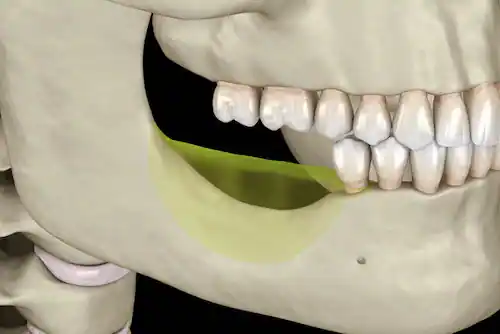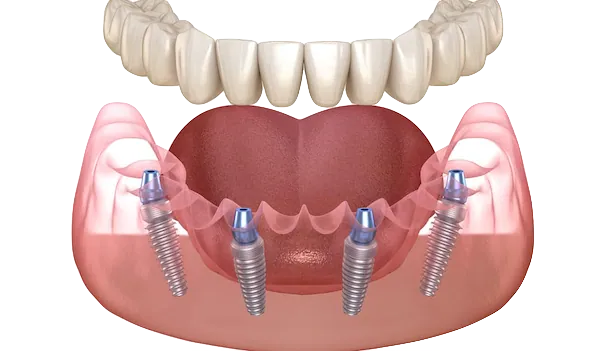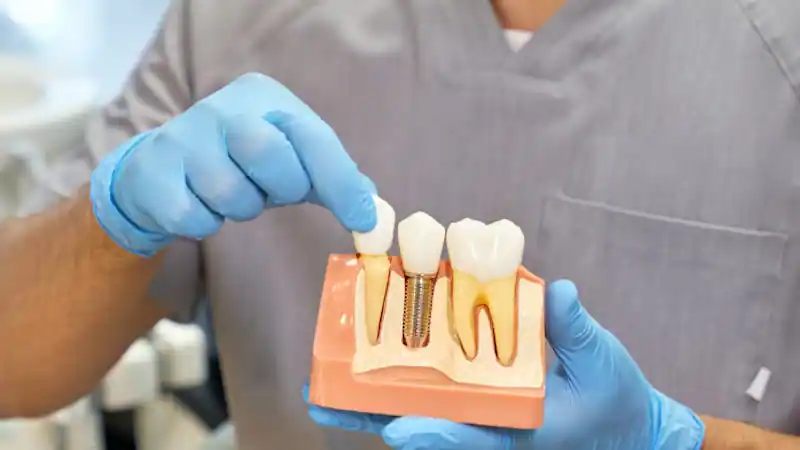Are you curious about the lifespan of dental implants? This article provides an explanation for how long they typically endure and the underlying causes.
Dental Implants longevity
Dental implants can last a very long time with proper care and maintenance. In fact, they are often considered a permanent solution for missing teeth. The lifespan of a dental implant can vary depending on a number of factors, such as the quality of the implant, the skill of the surgeon who placed it, and how well the patient takes care of it.
On average, dental implants can last for 20 to 25 years or even more. Some patients have had their implants for 30 years or more with no problems. In some cases, implants may fail earlier due to infection, trauma, or other factors.
Good oral hygiene and regular dental check-ups are essential for maintaining the health of dental implants and ensuring their longevity.
When contemplating dental implants, it’s normal to have questions about their durability and the variables that may influence their longevity. This article explores crucial factors that can affect the lifespan of your dental implants and provides recommendations for maximizing the benefits of your new teeth.
Regardless of whether you’re presently experiencing the advantages of dental implants or are still exploring alternatives, this resource will help you make knowledgeable decisions about your oral wellness and long-term investment.
As a dependable and efficient remedy for tooth loss, dental implants have gained widespread recognition. Although they are intended to persist indefinitely, the durability of dental implants may be impacted by several factors.
These factors may be within our jurisdiction, such as our dental hygiene practices and way of life, or beyond our control, such as our medical history and genetics. This article will scrutinize these aspects and offer suggestions on how to promote the durability of your dental implants.
Oral hygiene
One of the crucial aspects of preserving the durability of dental implants is maintaining good oral hygiene. Consistently brushing and flossing your implants at least twice a day with a soft-bristled toothbrush and toothpaste is essential to prevent infection, gum disease, and implant failure.
When bacteria and plaque accumulate around the implants, it can cause gum inflammation, which can eventually result in complications or failure of the implants. By dedicating a few minutes each day to oral hygiene, you can significantly prolong the lifespan of your implants and keep them aesthetically pleasing for years.
Besides practicing daily oral care, it is vital to schedule routine check-ups and cleanings with your dentist. By doing so, your dentist can oversee the condition of your implants and detect any issues early on, such as indications of infection or gum disease. This is critical because it enables your dentist to take proactive measures to address any problems with your dental implants before they cause significant harm.
Professional cleanings of dental implants will eliminate any accumulation of tartar or calculus that might have developed around your implants and sustain the attractiveness and health of your smile until your next maintenance is required. Remember, prevention is always better than cure.
Medical history
The success and durability of dental implants can be significantly influenced by your medical history. Certain medical conditions, such as uncontrolled diabetes or autoimmune disorders, can affect the strength and density of the jawbone, making it difficult for the implant to anchor securely.
For example, if you have diabetes, your blood sugar levels may be excessively high, causing damage to the nerves and blood vessels in your mouth. This can hinder the healing process and weaken the bone surrounding your implant, elevating the risk of implant failure. Similarly, if you have an autoimmune disorder like lupus, your body may attack healthy tissues, including those in your mouth, resulting in inflammation and bone loss.

Medications that influence the immune system, such as corticosteroids or chemotherapy, can also disrupt the healing process and heighten the chances of dental implant failure. These medications can weaken the immune system and lower the body’s ability to fend off infections, leading to complications during the healing period.
Lifestyle choices can also have a significant impact on dental implants, particularly smoking. Smoking hinders healing, especially in the mouth, and increases the risk of implant failure. Similarly, having a high body mass index (BMI) of over 50 can affect the success of dental implants. Obesity can exert extra pressure on the jawbone and compromise the stability of the implant, resulting in complications and implant failure.
For the best possible outcome of your dental implant procedure, it is crucial to discuss all aspects of your medical history with your smile consultant and dentist during your visit to Dental & Implant Centers Of Colorado. Your dentist can assess your health and determine if you are a suitable candidate for the procedure or if additional treatment or medication is necessary to manage any underlying health conditions. Addressing any medical concerns at the outset can help ensure the longevity of your implants.
At Dental & Implant Centers Of Colorado, we take a comprehensive approach to ensure that our patients receive the best possible care, considering all factors that may impact the success of your dental implants, including medical history. We collaborate with you individually to create a personalized treatment plan that takes into account your unique health factors to provide the best possible outcome for your dental implants.
Bone density
One crucial aspect of determining the longevity of dental implants is the density of the bone that supports them. The quality and quantity of bone can significantly impact the success of the procedure. Various factors such as gum disease, tooth loss, or jawbone injury can compromise bone density.
When a tooth or root is lost, the bone that used to surround it may begin to deteriorate or become thin. This can make it challenging for the dental implant and tooth replacement to fuse securely to the bone, like building a house on an unstable or weak foundation. As a result, before undergoing dental implant surgery, your dentist will evaluate the quality and quantity of bone to ensure there is enough density to support the implants.
If the bone density is not sufficient for the dental implant, your dentist may suggest a bone graft or other procedures to enhance the strength and density of the bone. Bone grafting involves taking bone from another part of your body or using synthetic materials to add support to the jaw to hold your new dental implants firmly. This process will help to create a strong and durable foundation for your implants, ensuring their longevity.
It’s important to note that bone density can also be impacted by certain medical conditions and lifestyle factors. For instance, smoking can cause bone loss in the jaw, which can adversely affect the success of dental implants. Your dentist will consider all of these factors while creating a customized treatment plan for you.
To ensure the long-term success of your implants, it’s essential to maintain healthy bone density. Your dentist will assess your bone density before recommending dental implants and may recommend bone grafting or other procedures if needed. By addressing any bone density issues early on, you can increase the chances of your implants lasting a lifetime, resulting in a beautiful and healthy smile. To begin, take our quick quiz today to find out if you’re a candidate for dental implants!
Who can you rely on to ensure your success?
At Dental & Implant Centers Of Colorado, we recognize that every patient has distinct requirements and desires. Our customized approach guarantees that you receive personalized attention that fits your particular circumstances, ensuring the success of your dental implant procedure.
We provide a variety of dental implant alternatives, such as full-mouth dental implants and All-on-4, to offer you the most effective therapy plan for your dental requirements. Our cutting-edge facility is equipped with the most up-to-date technology and materials to provide you with the highest quality treatment.

At Dental & Implant Centers Of Colorado, we understand the importance of personalized care for each of our patients. Our team utilizes advanced technology, such as 3D imaging, to create precise surgical guides for a seamless and comfortable dental implant procedure. With a range of dental implant options, including full mouth dental implants and All-on-4, we strive to provide you with the best possible treatment plan to meet your specific dental needs.
Our state-of-the-art facility is equipped with the latest materials and technology to ensure the highest quality care possible. Our team of experts is dedicated to providing you with an unforgettable experience and ensuring that you leave with a healthy and beautiful smile.
Choosing Dental & Implant Centers Of Colorado for your dental implant procedure means choosing a team of experienced professionals who are committed to your satisfaction and long-term success. Don’t wait any longer to start your journey towards a healthier, more confident smile.
At Dental & Implant Centers Of Colorado, we offer a revolutionary treatment option called the 24-hour zirconia process, which allows patients to receive permanent zirconia teeth just 24 hours after surgery. Traditionally, dental implant procedures involve multiple appointments over several months, with patients wearing temporary teeth while the implants heal and integrate with the jawbone. With our 24-hour zirconia process, you can enjoy the benefits of a complete and beautiful smile in a fraction of the time.




